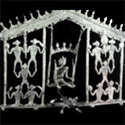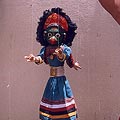Handloom weaving is an age-old tradition deeply rooted in the Rai and Limbu ethnic groups of the Eastern hills of Nepal. Passed down through generations, this sacred craft holds a wealth of knowledge and skill. Its intricate designs, inspired by the patterns and motifs found in nature, serve as a meaningful link to ancestral heritage, making it one of Nepal’s most cherished forms of craftsmanship.
In the Dhankuta, A remarkable woman who stands as the sole weaver, creating stunning diamond-shaped patterns using vibrant, colorful yarn.
Employing a traditional bamboo handloom known as the “thetta,” this weave is practised by the women. Handed down over generations. The patterns are named and form an integral part of Rai and Limbu culture as they symbolizing the rich heritage of the communities with each pattern holding deep significance. In addition special textiles are worn on special occasions such as weddings and ritual and cultural celebrations, playing an essential role in the attire of Rai and Limbu communities.This includes the Sangtang khasto.
However with changing times, there is a decline in the generational cycle that has traditionally perpetuated these skills with the learning and skills of craftsmanship being more endangered.
YOUR VIEWS
PRACTITIONERS: INDIA
Access 70,000+ practitioners in 2500+ crafts across India.
BIBLIOGRAPHY
10,000+ listings on arts, crafts, design, heritage, culture etc.
GLOSSARY
Rich and often unfamiliar vocabulary of crafts and textiles.
SHOP at India InCH
Needs to be written.






